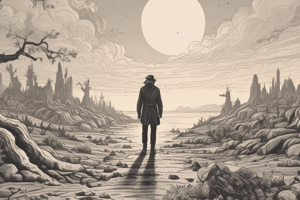Podcast
Questions and Answers
What is the effect of the heavy use of alliteration and monosyllables in the first line?
What is the effect of the heavy use of alliteration and monosyllables in the first line?
- It distracts the reader from the poem's meaning
- It creates a foreboding rhythm (correct)
- It creates a sense of calmness
- It is a grammatical error
What does the collective pronoun 'we' suggest in the line 'What hours, O what black hours we have spent'?
What does the collective pronoun 'we' suggest in the line 'What hours, O what black hours we have spent'?
- The poet is using a figure of speech
- The poet's mind, body, and spirit have suffered through the night (correct)
- The poet is addressing someone else
- The poet is referring to a specific event
What is the poet's tone in the line 'What sights you, heart, saw; ways you went!'?
What is the poet's tone in the line 'What sights you, heart, saw; ways you went!'?
- Anguished and distressed (correct)
- Calm and reflective
- Hopeful and optimistic
- Indifferent and detached
What does the 'longer light's delay' represent in the poem?
What does the 'longer light's delay' represent in the poem?
What is the poet suggesting with the line 'God's most deep decree bitter would have me taste'?
What is the poet suggesting with the line 'God's most deep decree bitter would have me taste'?
Flashcards
Effect of alliteration and monosyllables?
Effect of alliteration and monosyllables?
Creates a foreboding rhythm.
'We' in "What hours...we have spent"?
'We' in "What hours...we have spent"?
Suggests the poet's suffering.
Tone in "What sights...went!"
Tone in "What sights...went!"
Anguished and distressed.
Representing 'longer light's delay'?
Representing 'longer light's delay'?
Signup and view all the flashcards
Poet's suggestion in "God's decree... taste"?
Poet's suggestion in "God's decree... taste"?
Signup and view all the flashcards
Study Notes
Poem Analysis
- The poem explores Hopkins' feelings of depression, using phrases like "fell of dark" to convey a sense of malevolence and foreboding rhythm.
- The use of collective pronoun "we" in "What hours, O what black hours we have spent" suggests that every part of Hopkins' being (mind, body, and spirit) has suffered through the night.
Imagery and Symbolism
- "Black hours" represent the depression Hopkins has endured throughout the night.
- The "heart" is addressed as the core of Hopkins' being, suggesting it has suffered the most.
- The "longer light's delay" may symbolize the drawn-out day ahead of him.
- The simile "cries like dead letters sent" conveys the feeling of futile efforts to ask for help.
Metaphors and Personification
- Hopkins feels like "gall" or corroding, and "heartburn" conveys his inner suffering.
- The metaphor "God's most deep decree" implies that Hopkins feels commanded to taste bitter.
- The image of "bones built in me, flesh filled, blood brimmed the curse" suggests that even his blood overflows with affliction.
Spirit and Redemption
- The compound word "selfyeast" suggests that Hopkins' spirit is almost turning, but cannot rise out of despair.
- The recognition that the "lost" souls are like him, with their own "scourge" or affliction, adds to the sense of hopelessness.
- The image of their "sweating selves" is visceral and uncomfortable, conveying the torture they endure.
Studying That Suits You
Use AI to generate personalized quizzes and flashcards to suit your learning preferences.



